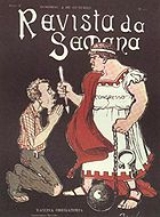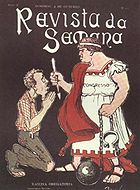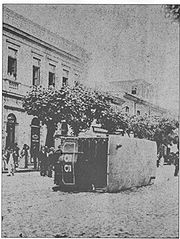
Vaccine Revolt
Encyclopedia

Riot
A riot is a form of civil disorder characterized often by what is thought of as disorganized groups lashing out in a sudden and intense rash of violence against authority, property or people. While individuals may attempt to lead or control a riot, riots are thought to be typically chaotic and...
which occurred in the city of Rio de Janeiro
Rio de Janeiro
Rio de Janeiro , commonly referred to simply as Rio, is the capital city of the State of Rio de Janeiro, the second largest city of Brazil, and the third largest metropolitan area and agglomeration in South America, boasting approximately 6.3 million people within the city proper, making it the 6th...
, Brazil
Brazil
Brazil , officially the Federative Republic of Brazil , is the largest country in South America. It is the world's fifth largest country, both by geographical area and by population with over 192 million people...
, November 10 through 16, 1904.
Antecedents
At the beginning of the 20th century the city of Rio de Janeiro, then capital of Brazil, although noted for beautiful palaces and mansions, also suffered from serious inadequacies in infrastructureInfrastructure
Infrastructure is basic physical and organizational structures needed for the operation of a society or enterprise, or the services and facilities necessary for an economy to function...
, including insufficient water and sewer systems, irregular garbage collection, and densely populated tenements.
In this environment many illnesses proliferated, including tuberculosis
Tuberculosis
Tuberculosis, MTB, or TB is a common, and in many cases lethal, infectious disease caused by various strains of mycobacteria, usually Mycobacterium tuberculosis. Tuberculosis usually attacks the lungs but can also affect other parts of the body...
, measles
Measles
Measles, also known as rubeola or morbilli, is an infection of the respiratory system caused by a virus, specifically a paramyxovirus of the genus Morbillivirus. Morbilliviruses, like other paramyxoviruses, are enveloped, single-stranded, negative-sense RNA viruses...
, typhus
Typhus
Epidemic typhus is a form of typhus so named because the disease often causes epidemics following wars and natural disasters...
and leprosy
Leprosy
Leprosy or Hansen's disease is a chronic disease caused by the bacteria Mycobacterium leprae and Mycobacterium lepromatosis. Named after physician Gerhard Armauer Hansen, leprosy is primarily a granulomatous disease of the peripheral nerves and mucosa of the upper respiratory tract; skin lesions...
. From time to time epidemics of yellow fever
Yellow fever
Yellow fever is an acute viral hemorrhagic disease. The virus is a 40 to 50 nm enveloped RNA virus with positive sense of the Flaviviridae family....
, smallpox
Smallpox
Smallpox was an infectious disease unique to humans, caused by either of two virus variants, Variola major and Variola minor. The disease is also known by the Latin names Variola or Variola vera, which is a derivative of the Latin varius, meaning "spotted", or varus, meaning "pimple"...
and bubonic plague
Bubonic plague
Plague is a deadly infectious disease that is caused by the enterobacteria Yersinia pestis, named after the French-Swiss bacteriologist Alexandre Yersin. Primarily carried by rodents and spread to humans via fleas, the disease is notorious throughout history, due to the unrivaled scale of death...
occurred. Between 1897 and 1906, 4,000 European immigrants died in Rio de Janeiro from yellow fever alone.
Beginning in 1902, president
President of Brazil
The president of Brazil is both the head of state and head of government of the Federative Republic of Brazil. The president leads the executive branch of the federal government and is the commander-in-chief of the Brazilian Armed Forces...
Rodrigues Alves determined to improve hygiene and modernize the city. He gave plenary powers to the city’s mayor Pereira Passos and to Director General of Public Health Dr. Oswaldo Cruz
Oswaldo Cruz
Oswaldo Gonçalves Cruz, better known as Oswaldo Cruz |São Paulo]] state, Brazil – February 11, 1917, Petrópolis, Rio de Janeiro state) was a Brazilian physician, bacteriologist, epidemiologist and public health officer and the founder of the Oswaldo Cruz Institute.He also occupied the 5th chair of...
to execute sweeping sanitary improvements.
The mayor initiated an extensive urban reform program, which was popularly termed the bota abaixo ("throwing down or out"), in reference to the demolition of older buildings and tenement houses, with subsequent conversion of the land to stately avenues, gardens, and upscale homes and businesses. Thousands of poor people were displaced to peripheral neighborhoods.
Dr. Cruz created the Brigadas Mata Mosquitos (Mosquito-Killing Brigades), groups of sanitary service workers who entered homes in order to exterminate the mosquito
Mosquito
Mosquitoes are members of a family of nematocerid flies: the Culicidae . The word Mosquito is from the Spanish and Portuguese for little fly...
es which transmitted yellow fever. The campaign also worked to exterminate rat
Rat
Rats are various medium-sized, long-tailed rodents of the superfamily Muroidea. "True rats" are members of the genus Rattus, the most important of which to humans are the black rat, Rattus rattus, and the brown rat, Rattus norvegicus...
s which transmitted bubonic plague, distributing rat poison and requiring proper handling, storage, and collection of garbage.
The popular revolt

Vaccination
Vaccination is the administration of antigenic material to stimulate the immune system of an individual to develop adaptive immunity to a disease. Vaccines can prevent or ameliorate the effects of infection by many pathogens...
by force.
The population was confused and discontented. The city seemed in ruins, many people had lost their homes, while others had had their homes invaded by the health workers and police. Articles in the press criticized the action of the government and spoke of possible risks of the vaccine. Moreover, it was rumored that the vaccine would have to be applied to the “intimate parts” of the body (or at least that women would have to undress in order to be vaccinated), aggravating the anger of the population, and resulting in a popular rebellion.
The approval of the Vaccination Law was the proximate cause of the revolt: on November 5, the opposition created the Liga Contra a Vacina Obrigatória (League Against Mandatory Vaccination).
From November 10 through 16, the city became a battlefield. The excited population looted shops, overturned and burned trams, made barricades, pulled out tracks, broke poles, and attacked government forces with rocks, sticks, and debris. On November 14, the cadets of the Escola Militar da Praia Vermelha (military college) also mutinied against the government’s actions. In reaction, the government suspended mandatory vaccination and declared a state of siege. The rebellion was contained, leaving 30 dead and 110 wounded. Hundreds of imprisoned people were deported to the then frontier region of Acre
Acre (state)
Acre is one of the 27 states of Brazil. It is situated in the southwest of the Northern Region, bordering Amazonas to the north, Rondônia to the east, Bolivia to the southeast and the Ucayali Region of Peru to the south and west. It occupies an area of 152,581.4 km2, being slightly smaller...
.
After the government resumed control, the vaccination process was restarted, resulting in smallpox eventually being eradicated from the city. The international medical community at large regarded Dr. Cruz' efforts in the affair with considerable sympathy: in 1907, the 14th International Congress on Hygiene and Demography in Berlin awarded him their gold medal.
On Fiction
- Scliar; MoacyrMoacyr ScliarMoacyr Jaime Scliar was a Brazilian writer and physician.Scliar is best known outside Brazil for his 1981 novel Max and the Cats , the story of a young man who flees Berlin after he comes to the attention of the Nazis for having had an affair with a married woman...
– "Sonhos Tropicais" (Tropical Dreams) Cia das Letras 1992 ISBN 8571642494 - "Sonhos Tropicais" an 2001 Film adaptation of cited Scliar's book. Synopsis: in english and in portuguese
Further reading
- http://www.jstor.org/pss/980810
Positivism and Revolution in Brazil's First Republic:
The 1904 Revolt
Robert G. Nachman
The Americas, Vol. 34, No. 1 (Jul., 1977), pp. 20–39
(article consists of 20 pages)
Published by: Catholic University of America Press on
behalf of Academy of American Franciscan History
Stable URL: http://www.jstor.org/stable/980810

